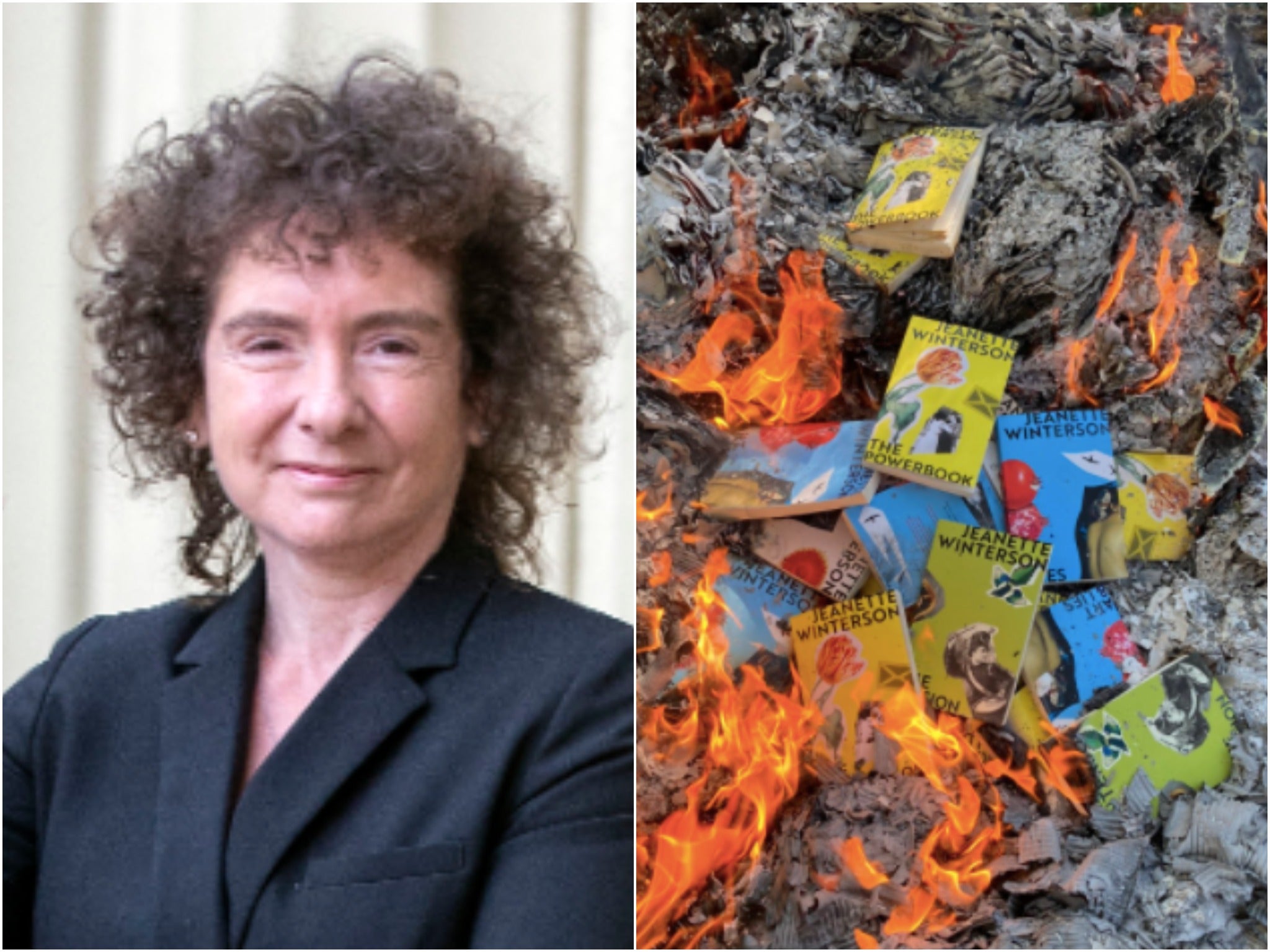Jeanette Winterson’s book burning stunt is a masterclass in staying relevant and edgy
In all the furore, it’s perhaps a shame no one is talking about how Winterson’s books are absolutely wonderful, as fresh and exhilarating now as they were when newly published


Your support helps us to tell the story
From reproductive rights to climate change to Big Tech, The Independent is on the ground when the story is developing. Whether it's investigating the financials of Elon Musk's pro-Trump PAC or producing our latest documentary, 'The A Word', which shines a light on the American women fighting for reproductive rights, we know how important it is to parse out the facts from the messaging.
At such a critical moment in US history, we need reporters on the ground. Your donation allows us to keep sending journalists to speak to both sides of the story.
The Independent is trusted by Americans across the entire political spectrum. And unlike many other quality news outlets, we choose not to lock Americans out of our reporting and analysis with paywalls. We believe quality journalism should be available to everyone, paid for by those who can afford it.
Your support makes all the difference.The world of publishing is aflame.
“Absolutely hated the cosy little domestic blurbs on my new covers,” tweeted the prize-winning author Jeanette Winterson, OBE, CBE, fellow of the Royal Society of Literature. “Turned me into wimmins fiction of the worst kind! Nothing playful or strange or the ahead of time stuff that’s in there. So I set them on fire.” Beneath is a picture of a small pile of paperbacks, going up in smoke.
With its echoes of Nazi book burnings and the dig at women’s fiction, this is scandal itself. It is also the most tremendous generator of free column inches, especially given that these are books (The Passion, Written on the Body, Art and Lies and The Powerbook) that were written more than two decades ago, between 1997 and 2000.
Every year in the UK, the number of books published totals between eight and 10 squillion. (For those interested, precise figures are hard to come by, but it’s in the region of 200,000.)
Reviews, interviews and advertising space all go to the newest, the most exciting, the Next Big Thing. Once a book has been out a few weeks, it will almost certainly be pushed aside in the marketing wars, ready for the latest publishing sensation.
This is why debut authors are so exciting to the press, why we see so many books by and about celebrities, why TV and film adaptations of past favourites are celebrated with new tie-in covers.
And it means that once a book is out, it can easily be forgotten. Most books are. Books pile up in charity shops. (In 2017, the Swansea branch of Oxfam received so many copies of Dan Brown’s The Da Vinci Code that they begged customers to send future donations elsewhere.) Remaindered books (those that have gone out of print) are sold off cheaply in Poundland and The Works. Every year, thousands of books are pulped. So, how to save them from destruction? How do authors and their publishers keep interest in the back catalogue alive?
In this case, Penguin has re-jacketed – that is, given matching new covers – to Winterson’s books, along with some glowing praise from industry big guns such as Rachel Cusk, The Literary Review, Ali Smith and Simon Schama.
True, the blurbs showing on Amazon sound a tad young adult dystopia, with lines such as: “You can be the hero of your own life. You can have freedom for just one night. But there is a price to pay”. But are they really so terrible that they need to be burnt?
Look closer at Winterson’s flaming composition, and you might notice that the books are almost all the right way up, on a heap of ash that is clearly corrugated cardboard. Only a couple are actually on fire. With a water pistol and some oven gloves, she could probably fish the rest out and put them back on her shelf. It reminded me a little of the Banksy that shredded itself mid-auction, and in consequence, was worth much, much more.
Authors are generally sent a handful of books with each new publication. We give them to friends and family, donate them to charity auctions and then, when there are still a few left, shove them under the bed. No one that I know has ever deployed their early editions with the elan that Winterson has just displayed.
Yes, it’s sad that a few copies are charred. But with the interest she has generated, the discussion, the outrage, she has reminded us of her status as the edgy, muscular author of the 1990s and 2000s, whose gender-fluid books, with their leaps through time and space, may now reach a whole slew of new readers.
One publishing PR director, speaking anonymously, said: “She gets to be on-brand as a radical author who isn’t mainstream, whilst getting mainstream PR on it.”
Even the dig at women’s fiction, although unpleasant, is clever; women’s fiction sells in far greater quantities than literary fiction, which is heavily reliant on prizes such as the Booker for its big hits. “I think it’s a publicity stunt,” one Sunday Times bestselling author of just such fiction told me. “And it might be successful, if you don’t mind looking like a bit of an arsehole. But trashing a whole genre to elevate yourself is about as unpleasant a strategy as burning books.”
Winterson almost certainly doesn’t mind, although was quick to point out to her detractors that she is, generally, very eco-friendly. Less friendly towards other authors seeking a kind word from her for their own back covers, mind, saying, “I would just add that I have never burned anyone else’s books; not even awful ones sent in the post.” And it is worth noting that in 1994, after journalist Nicci Gerrard published a mildly critical article in The Observer, Winterson turned up on her doorstep and shouted at her.
When they work, publishing stunts are wonderful. Hilary Mantel’s The Mirror And The Light was celebrated by its publisher, 4th Estate, with a billboard in Leicester Square, prompting a storm of online speculation, never mind that no one beyond whoever runs the Waterstones Piccadilly social media account seems ever to have seen it in the flesh.
Then there are the publishing stunts that go wrong. Witness the horror that greeted the floral table decorations, adorned with what appeared to be barbed wire, in celebration of the publication of American Dirt. With the Mexican migrant experience used as a prop to sell a book, the huge response was one of sheer disgust. Not unrelatedly, the book sold more than half a million copies, and became a No 1 New York Times bestseller.
Winterson’s actions do come across as somewhat hot-tempered; she could, after all, simply have written her publishers an email. Still, how literary fiction is sold, the packaging of women’s fiction, and how past publications can reach new audiences; all are topics that need bringing out into the fresh air.
While for her publisher, Penguin Random House, it is a useful distraction from the recent spat with Waterstones, only just resolved, in which Penguin’s titles were pulled from shelves across the UK in a dispute over the bookselling chain’s credit limits.
Oh, and by the way, Jeanette Winterson’s books are absolutely wonderful, as fresh and exhilarating now as they were when newly published. In all the furore, it’s perhaps a shame no one is talking about that.
Join our commenting forum
Join thought-provoking conversations, follow other Independent readers and see their replies
Comments